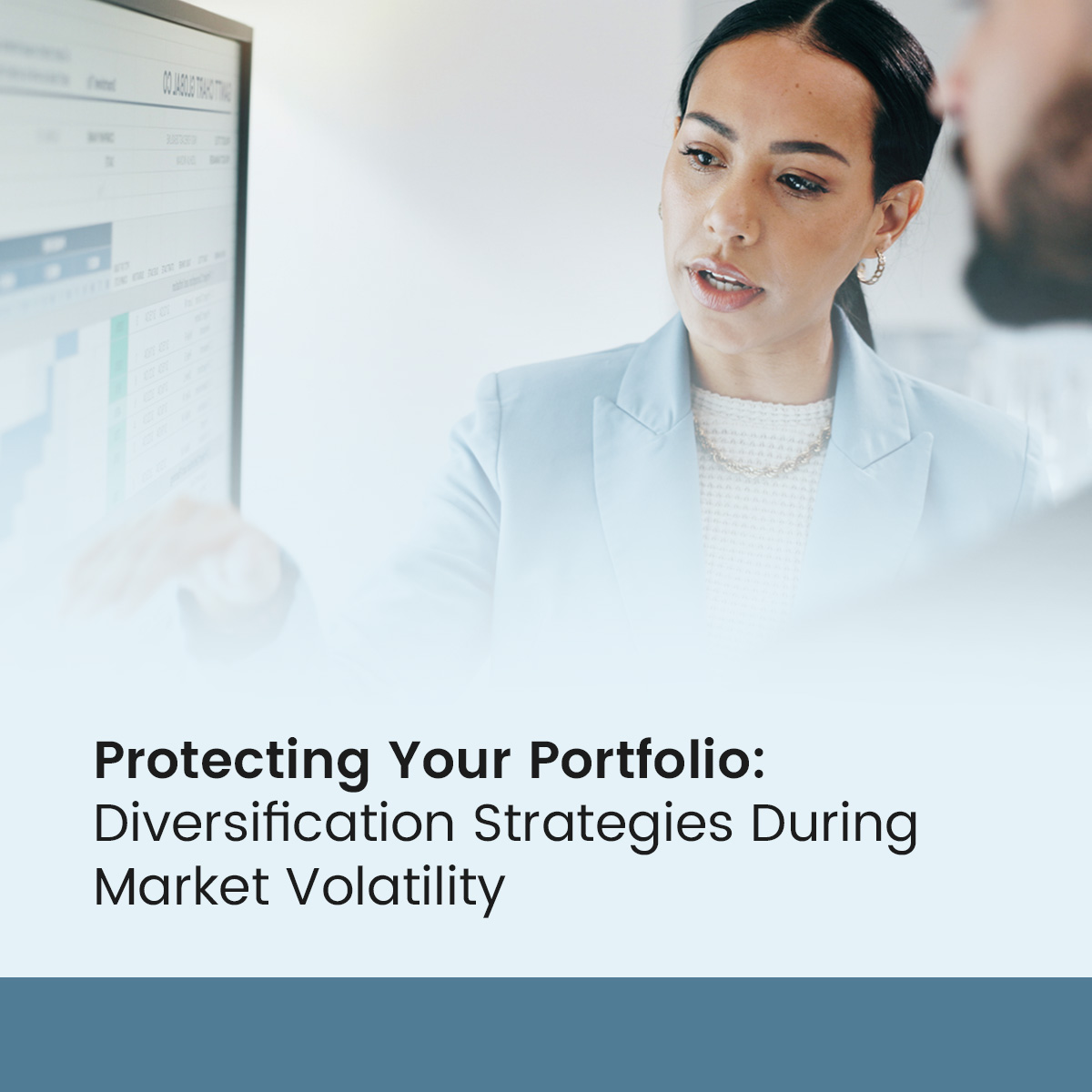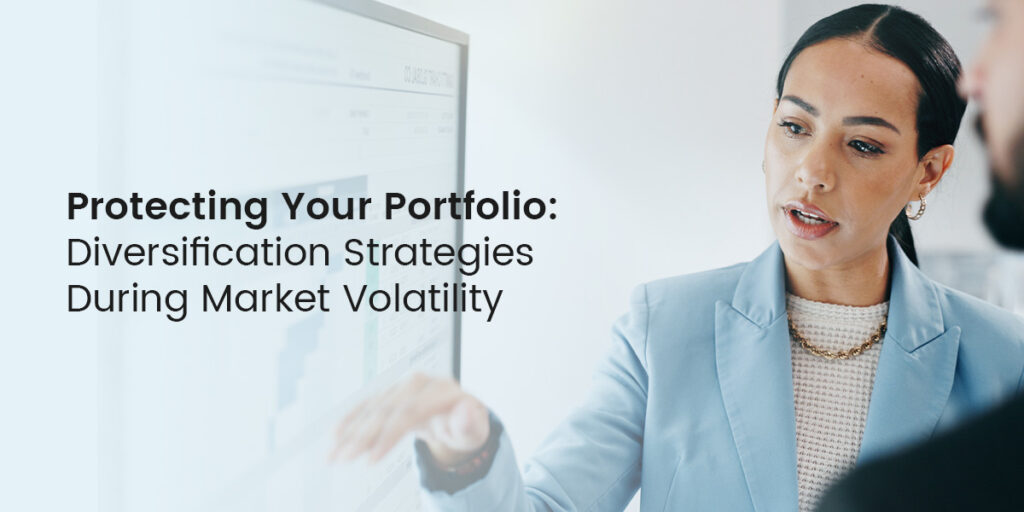Protecting Your Portfolio: Diversification Strategies During Market Volatility


Political or economic changes can cause shifts or uncertainties in the market. If you’ve invested a significant amount in certain assets, this uncertainty can be uncomfortable and may even cause you to panic. Diversifying investments in a volatile market can help you manage risk. Adjusting your portfolio while still ensuring you have your long-term goals in mind can help you optimize your returns, despite the market’s behavior. Here are the strategies to consider.
How to Beat Market Volatility Through a Diversified Portfolio
Investment diversification can protect your assets by locking in rates, reducing your taxes or safeguarding your family’s inheritance.
1. Reassess Your Current Investments
Have you been strictly investing in the stock market? Maybe you only invest in real estate. Exploring alternative options can diversify your portfolio and protect you from market fluctuations. You may consider certificates of deposit, bonds, gold, or foreign investments. Here’s why they can work during uncertainties:
- Certificates of deposit (CDs): A CD is a savings account that locks in an interest rate on the money you put in for an agreed-upon period. Terms typically range from three-, six-, or 12-month periods. You can also opt for longer terms, ranging from four- to 10-year periods. Because CDs generally pay higher interest rates than traditional savings and money market accounts, you can count on your money to grow regardless of the market’s volatility.
- Bonds: With bonds, you lend funds to government entities or companies for a set period. They will borrow money from you to use for projects such as schools and roads, or purchase property and equipment to grow their business. The borrower may have variable or fixed interest payments, depending on the agreed terms. That said, note that when bond prices go up, rates go down and vice versa. Learn more about bonds here.
- Gold: Gold is more uncorrelated with stocks and other assets than silver, so it has historically been an effective asset for diversifying investments. Gold also has fewer industrial use cases, making it less affected by what happens to the economy. When investing in gold, you can choose to purchase the physical metals, exchange-traded funds, or invest in mining stocks.
- Foreign investments: Consider foreign investments if you’re willing to purchase companies or assets from another country. You can engage in foreign direct investments (FDIs), where you purchase buildings of a company, or in foreign portfolio investments (FPIs), where you purchase shares, bonds, or other securities of foreign businesses.
Diversifying your investments manages risk and can increase your chances of higher returns. That said, diversification is not the only solution. You still need to review and adjust your investments regularly. You can opt for wealth management tools to track your investments or work with a fiduciary advisor to actively manage your assets for you. Both can help you optimize your portfolio and manage risks, helping you get closer to your financial goals.
2. Consider Derivatives

A derivative is a contract where you and another party agree on the price of a specific security or asset to be settled at a later date. Because you agree on a price far before the purchase date, this can be a good way to manage the risk of a volatile market, as you already know how much you’ll pay for the specific asset in the future. The goal is to pay less for an asset than it will be worth in the future, however, the value of an asset may also decrease over time. This can be more handy for certain industries than others.
For instance, if a construction company knows it will need a large amount of lumber for a future project, a derivative can help the company pay for the product at a specific price, regardless of whether the product value increases by the time the company needs the lumber.
Options are one category of derivatives that give you the right to purchase an asset, but you’re not necessarily obliged to buy it. You can get this contract for multiple types of investments, including equities, commodities, and currencies, although most investors usually think of equities when they hear about options.
3. Review Your Life Insurance Options
Life insurance may not be top of mind when thinking about investments. However, it can help you manage risks during a volatile market. Some policies can serve as an asset you can use during your lifetime. For instance, some life insurance policies allow you to take withdrawals, provided you follow the rules.
When shopping for life insurance, consider which policies have cash value. While you typically have to pay a premium, some policies even offer guaranteed minimum growth, regardless of the market conditions.
4. Apply Tax-Efficient Strategies for High-Net-Worth Individuals
Risk management for high-net-worth individuals involves optimizing for taxes. Financial advisors and tax professionals can help you review your financial plan and investment portfolio to identify where you can mitigate risks. For instance, they may suggest engaging in charitable activities toward causes that matter to you. Apart from providing much-needed help to the recipients, you also enjoy tax benefits from your qualifying charitable contributions.
Professionals may also suggest other strategies like tax-loss harvesting or Roth conversions. With tax-loss harvesting, you may sell assets at a loss, but offset capital gains elsewhere. Capital gains taxes can negatively impact your investments, making the timing of your sales for these assets essential. A Roth conversion moves your assets from a pretax retirement account into a Roth IRA. You must pay taxes on the converted amount, but then you can enjoy tax-free withdrawals and a lower taxable estate.
How to Prepare for Retirement Amid Market Volatility
One challenge of nearing retirement during a volatile market is seeing your portfolio’s performance change drastically in short periods, while knowing that you’ll be potentially withdrawing some of those funds at a loss. With that in mind, it’s essential to follow through with your plan and your long-term goals and avoid selling investments when you’re primarily driven by emotion.
Once you try to time the market and sell an asset, it can be more challenging to reenter. Working with a financial advisor can provide an objective view and suggest ways you can move forward. Use our advisor matching quiz to find a financial advisor for retirement planning.
Additionally, creating a diversified portfolio impacts your family’s potential inheritance. Creating a comprehensive estate plan can help protect your wealth and ensure it gets to your loved ones as you wish. For instance, with an estate plan, you can ensure your portfolio has sufficient liquidity to pay for estate taxes. This way, your loved ones won’t have to worry about paying taxes on their inheritance with money from their own pockets.
You may also consider trusts and gifting to minimize these taxes. Opting for income-generating assets can also offer your loved ones a steady stream of income, building more wealth on top of what you’ve prepared for them.
Why Trust Our Financial Advisors
Our company has been offering financial services for over 20 years. We provide thoughtful investment strategies that help investors navigate the volatile market. Instead of timing the market, we design flexible and stable portfolios, helping our clients achieve their long-term financial goals.
We are fiduciary advisors, meaning we are legally bound to uphold our clients’ interests first. We only recommend products that fit your overall investment plan, ensuring we offer an ethical service with integrity. Whether you need help managing your personal finances, investing in your business, or creating a retirement plan, you can trust us to help you.
Secure Your Investments Today
Diversifying your portfolio can be a good way to protect your investments during a volatile market. As a high-net-worth individual, you may have more to lose with risky decisions. Working with our financial advisors can provide objective advice on which steps you could take.
We’re an investment advisor, so you can enjoy our service free of hidden fees, product biases, and conflicting motivations. Transparency is at the core of our service, as we prioritize helping you achieve your financial goals. If you’re ready to get started, talk with an advisor today.


